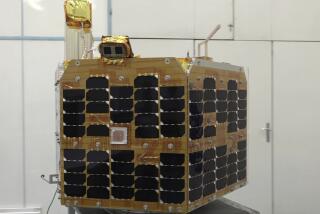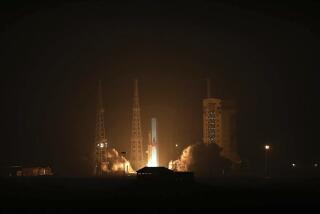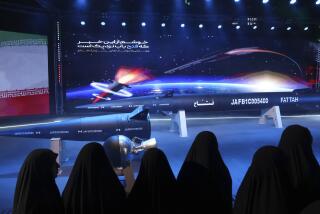Monkey welcomed back to Iran, but U.S. not thrilled by space shot
BEIRUT — U.S. officials are not exactly welcoming Iran’s revelation this week that the Islamic Republic has sent a monkey into space and brought the creature back to Earth safely.
The report by Iranian media recalled for many the early days of space flight, when both the United States and the Soviet Union launched animal-bearing spacecraft as a prelude to human space travel.
But State Department spokeswoman Victoria Nuland told reporters in Washington on Monday that the reported mission raises concerns about possible Iranian violations of a United Nations ban on development of ballistic missiles capable of delivering nuclear weapons.
“If they have launched anything using ballistic missile technology, it’s of serious concern,” Nuland said.
There was no immediate comment from Tehran, which for some years has had a space exploration and satellite-launching program.
The West and Iran are at odds over Iran’s nuclear program, which Tehran says is strictly for peaceful uses, such as generation of energy and creation of cancer-treating isotopes. U.S. and Israeli officials suspect Iran wants to produce nuclear weapons.
Nuland said she could not confirm if the Iranian reports of successfully sending a primate into the atmosphere were true. “I saw the pictures of the poor little monkey preparing to go to space,” Nuland said.
[Updated 9:40 a.m. Jan. 29: Animal activists were also upset with the launch.
“We are appalled by photos of a visibly terrified monkey crudely strapped into a restraint device in which he was allegedly launched into space,” People for the Ethical Treatment of Animals (PETA) said in a statement, calling Tehran’s action a throwback to the “cruelest days” of space exploration. “Monkeys are highly intelligent and sensitive animals who not only are traumatized by the violence and noise of a launch and landing but also suffer when caged in a laboratory before and — if they survive — after a flight.”]
Iran said its spacecraft — dubbed Pishgam, or Pioneer — was launched Sunday and took the primate-bearing capsule to a height of 72 miles, before the craft returned to Earth.
In a clip from Press TV, Iran’s English-language service, a helicopter is seen apparently bringing the space capsule back to a site in central Iran where cheering scientists awaited its return. In footage shown on Iranian television, ecstatic scientists hugged each other and shouted, “Long live Iran!”
The Iranian press carried several photos and video clips of the monkey. In one shot, it is seen in the arms of a glove-wearing scientist, apparently after returning to Earth. In another, it is seen strapped into a car seat-like contraption, evidently designed for the trip aloft. The animal is also seen swaddled in a green blanket and seemingly befuddled about all the attention.
Iranian officials lauded the flight as a bringing the nation closer to human space travel.
“Sending a spacecraft and returning it is a first step toward sending humans to space in later stages,” Iran’s defense minister, Brig. Gen. Ahmad Vahidi, told Press TV.
The space-bound monkey was placed in a sealed capsule equipped with machinery to produce oxygen and absorb carbon dioxide, Iranian Space Agency Director Hamid Fazeli told Press TV.
“This kind of monkey’s physiology is very similar to humans,” Fazeli noted, without identifying what species of money was recruited for the mission. “We are [using] this monkey to test life support systems and flight conditions.”
The animal’s vital signs were to be monitored and transmitted to Earth, the Iranian space chief said, while cameras inside the cabin recorded the event.
Almost two years ago, Iranian press reports noted, Iran sent a “bio-capsule” containing a turtle, a mouse, worms and live bacteria into the heavens and successfully returned the menagerie back to Earth alive.
For all the global attention, and controversy, the simian sojourn did not create a lot of buzz inside Iran, where the ongoing economic crisis is the nation’s major preoccupation.
“It is something to be proud of,” agreed Sohrab Ahmadi, a technology student, who voiced the hope that such projects could create more jobs in science. He said he was in favor of “any way we can get financial help in this field from government.”
Less impressed was Salar Mirzaei, a chemistry engineering student. “For me,” Mirzaei said, “economic achievement and ... increasing purchasing power is more important than sending monkeys into space.”
ALSO:
Former Guatemalan dictator faces genocide trial
Mexicans cart away statue of late Azerbaijan leader
Bodies found in Mexico may be those of missing band
McDonnell reported from Beirut and special correspondent Mostaghim from Tehran.
More to Read
Sign up for Essential California
The most important California stories and recommendations in your inbox every morning.
You may occasionally receive promotional content from the Los Angeles Times.










